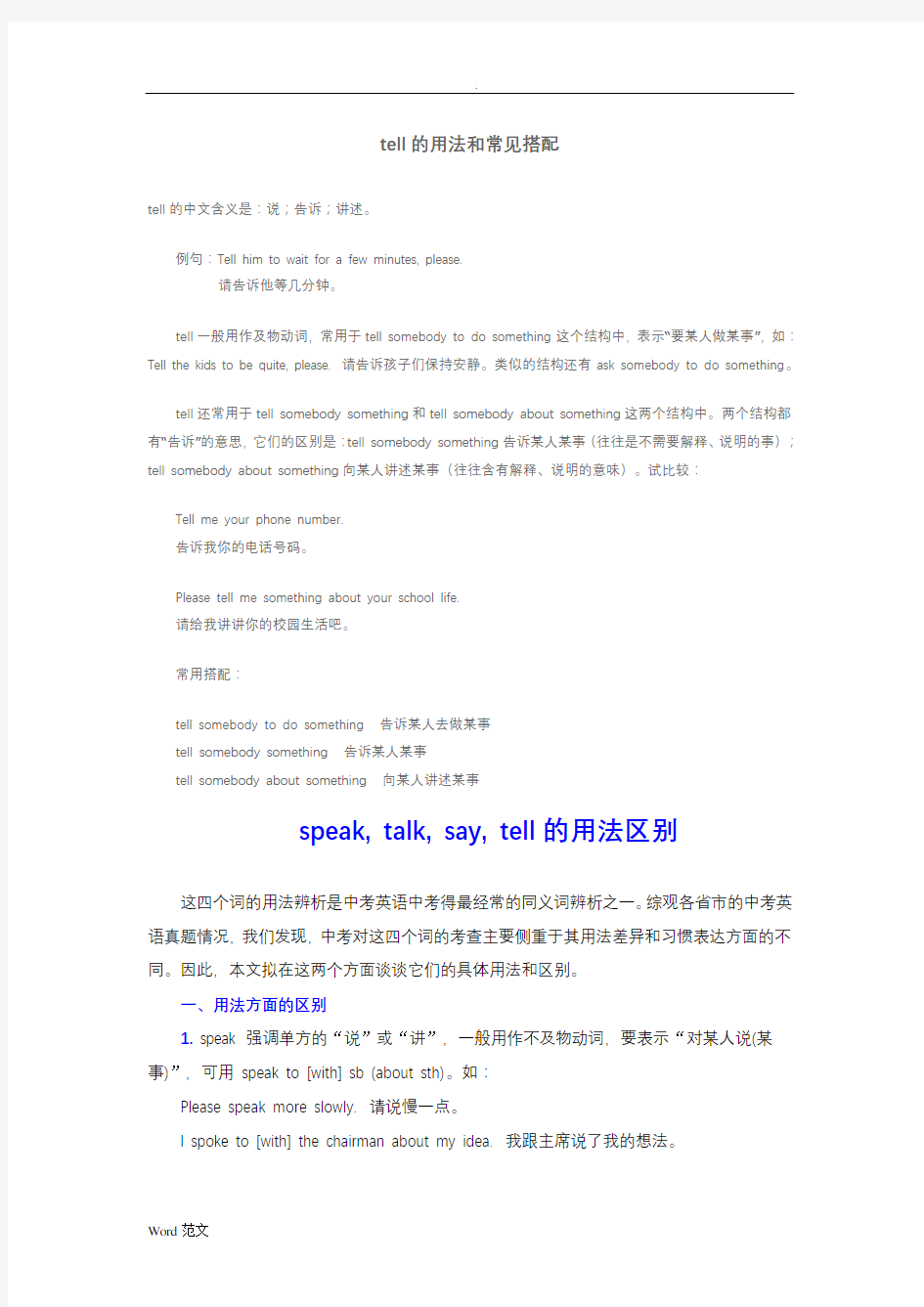tell的用法和常见搭配

- 1、下载文档前请自行甄别文档内容的完整性,平台不提供额外的编辑、内容补充、找答案等附加服务。
- 2、"仅部分预览"的文档,不可在线预览部分如存在完整性等问题,可反馈申请退款(可完整预览的文档不适用该条件!)。
- 3、如文档侵犯您的权益,请联系客服反馈,我们会尽快为您处理(人工客服工作时间:9:00-18:30)。
tell的用法和常见搭配
tell的中文含义是:说;告诉;讲述。
例句:Tell him to wait for a few minutes, please.
请告诉他等几分钟。
tell一般用作及物动词,常用于tell somebody to do something这个结构中,表示“要某人做某事”,如:Tell the kids to be quite, please. 请告诉孩子们保持安静。类似的结构还有ask somebody to do something。
tell还常用于tell somebody something和tell somebody about something这两个结构中。两个结构都有“告诉”的意思,它们的区别是:tell somebody something告诉某人某事(往往是不需要解释、说明的事);tell somebody about something向某人讲述某事(往往含有解释、说明的意味)。试比较:
Tell me your phone number.
告诉我你的电话号码。
Please tell me something about your school life.
请给我讲讲你的校园生活吧。
常用搭配:
tell somebody to do something告诉某人去做某事
tell somebody something告诉某人某事
tell somebody about something向某人讲述某事
speak, talk, say, tell的用法区别
这四个词的用法辨析是中考英语中考得最经常的同义词辨析之一。综观各省市的中考英语真题情况,我们发现,中考对这四个词的考查主要侧重于其用法差异和习惯表达方面的不同。因此,本文拟在这两个方面谈谈它们的具体用法和区别。
一、用法方面的区别
1. speak 强调单方的“说”或“讲”,一般用作不及物动词,要表示“对某人说(某事)”,可用speak to [with] sb (about sth)。如:
Please speak more slowly. 请说慢一点。
I spoke to [with] the chairman about my idea. 我跟主席说了我的想法。
2. talk 强调双方“交谈”,一般用作不及物动词,表示“同某人谈论(某事)”,可用talk to [with] sb (about sth)。如:
He was talking to [with] a friend. 他在同一位朋友谈话。
What are they talking about? 他们在谈论什么?
3. say 强调说话内容,一般用作及物动词。表示“对某人说”,可用say to sb。如:
Did you say anything (to him)? 你(对他)说了些什么?
He said (that) he wanted to go. 他说他想去。
注:以下句型值得注意:
据说他病了。
正:It is said that he is ill.
正:He is said to be ill.
4. tell 表示“告诉”,可接双宾语,双宾语易位时用介词to 引出间接宾语。如:
I told him my name. 我把名字告诉了他。
He told his parents the good news. / He told the good news to his parents. 他把这个好消息告诉了他父母。
注:还可接不定式的复合结构作宾语。如:
Tell her to come at once. 叫她马上来。
He told the children not to play in the street. 他叫孩子们不要在街上玩。
另外,有时与介词from 连用表示“区分”“辨别”等。如:
I cannot tell which is which. 我分不清哪个是哪个。
Can you tell true friends from false friends? 你能分清真假朋友吗?
especially,specially,particularly
■用于形容词或副词前,强调程度(通常译为“特别”),三者都可用。如:
It is particularly [especially, specially] cold today. 今天特别冷。
I was feeling particularly [especially, specially] tired this evening. 今天晚上我特别累。
有时也修饰动词。如:
I especially [particularly, specially] want to see that film. 我特别想看那部电影。
■用于强调目的(意为“特意”、“专门”), 通常用specially 或especially,一般与表目的的
不定式或介词for 短语连用。如:
We bought it specially [especially] for you. 这是我们特意为你买的。
I was asked specially to meet her. 特意要我去接她(from )。
The book is written especially [specially] for children. 这本书是专门为孩子们写的。
■表示陈述某一事实之后,列举一个具有代表性的例子,作进一步强调,一般用especially 或particularly,其后可接名词、介词短语、从句等。如:
We want to invite some friends, especially Jim and John. 我们想邀请几个朋友,尤其是吉姆和约翰。
He likes the country, especially in spring. 他喜欢乡村,尤其是在春天。
Noise is unpleasant, especially when you’re trying to sleep. 噪音是令人不愉快的,尤其
是当你想入睡的时候。
escape与flee
两者均有“逃”的意思,但有区别:
1.escape 表示“逃脱”,主要指从被监禁或类似没有自由的状态中逃脱。如:
Two prisoners escaped last night. 昨晚有两名犯人逃走了。
The fish escaped from the net. 鱼逃出了网。
注:有时用于引申义。如(from ):
He escaped punishment. 他逃过了惩罚。
She escaped being caught. 她没被抓住。
The fact escaped my notice. 我没注意到这一事实。
2.flee表示“逃走”,着重逃的动作,强调逃走时的急促或仓促。如:
The burglars were frightened and fled. 夜盗们受惊逃走了。
The enemy soldiers were fleeing in all directions. 敌兵们四处逃窜。
注:表示“逃跑”时,escape 是不及物动词,而flee 则可用作及物或不及物动词。如:He fled (from) the burning house. 他从燃烧的房子逃出。
elder, eldest & older, oldest
